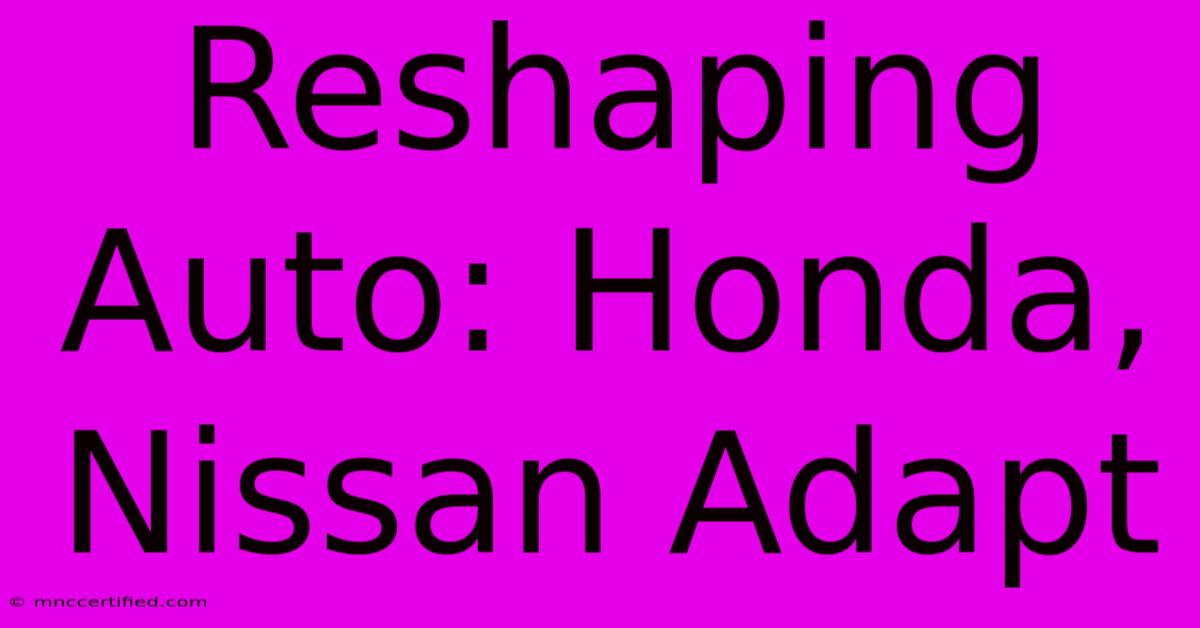Reshaping Auto: Honda, Nissan Adapt

Table of Contents
Reshaping Auto: How Honda and Nissan Are Adapting to Industry Disruption
The automotive industry is undergoing a dramatic transformation. Electric vehicles (EVs) are surging in popularity, autonomous driving technology is rapidly advancing, and consumer preferences are shifting. Two major players, Honda and Nissan, are navigating this complex landscape with different strategies, each aiming to reshape their future in the face of intense competition. This article will delve into the adaptation strategies of both automakers, analyzing their strengths, weaknesses, and the challenges they face.
Honda: A Focus on Electrification and Innovation
Honda has committed to a significant electrification strategy, aiming to electrify 100% of its new vehicle sales by 2040. This ambitious goal is backed by substantial investments in battery technology and electric vehicle development. They are focusing on a multi-pronged approach, encompassing:
- Hybrid Technology: Honda continues to refine its hybrid technology, offering fuel-efficient options across various vehicle segments. This acts as a bridge to full electrification, providing a transition path for consumers.
- Battery Electric Vehicles (BEVs): Honda is actively expanding its BEV lineup, with models like the Honda e and upcoming new EVs planned. The focus is on creating vehicles with competitive range, attractive design, and advanced features.
- Fuel Cell Electric Vehicles (FCEVs): While not as widely adopted as BEVs, Honda remains a leader in FCEV technology, believing this will play a significant role in the long-term future of sustainable transportation.
Honda's Strengths and Weaknesses
Strengths: Honda's strong reputation for reliability and fuel efficiency provides a solid foundation for its transition to electric vehicles. Their diverse technological portfolio, encompassing hybrids, BEVs, and FCEVs, allows them to hedge their bets and adapt to changing market demands.
Weaknesses: Honda's relatively slower adoption of BEVs compared to some competitors could be a disadvantage in the rapidly evolving EV market. They need to increase their market share in the EV sector to remain competitive.
Nissan: Electrification and Beyond – The Importance of the Leaf Legacy
Nissan, a pioneer in the mass-market EV space with the Nissan Leaf, is taking a more nuanced approach to industry disruption. While continuing to develop its EV lineup, they're also exploring other areas:
- EV Expansion: Nissan continues to improve its existing Leaf model and is actively developing and releasing new electric models.
- e-Power Technology: Nissan’s e-Power hybrid system uses an electric motor to drive the wheels, with a small gasoline engine acting as a generator. This offers the driving experience of an EV without the range anxiety.
- Focus on Emerging Markets: Nissan is strategically targeting growth in developing markets where the transition to electric vehicles may happen at a slower pace.
Nissan's Strengths and Weaknesses
Strengths: Nissan's early adoption of EVs with the Leaf established brand recognition and experience in the electric vehicle sector. Their e-Power technology provides a compelling alternative for consumers hesitant to fully embrace BEVs.
Weaknesses: Nissan faces challenges in competing with newer EV entrants who possess more advanced battery technology and charging infrastructure. The Leaf, while groundbreaking initially, needs significant advancements to remain competitive.
The Future of Honda and Nissan
Both Honda and Nissan face significant challenges in adapting to the evolving automotive landscape. Competition is fierce, with established automakers and new EV startups vying for market share. Successfully navigating this requires substantial investment in research and development, efficient supply chains, and a keen understanding of evolving consumer preferences. The companies that can effectively adapt their strategies and deliver innovative, compelling vehicles will be the ones who thrive in this new era of automotive innovation.
Keyword Optimization: A Note for SEO
This article strategically uses keywords throughout the text, including: Honda, Nissan, electric vehicles (EVs), BEVs, FCEVs, hybrid technology, e-Power, autonomous driving, automotive industry, electrification, market share, competition, innovation, and sustainable transportation. The keywords are naturally integrated within the context, ensuring readability is not compromised. Remember to conduct thorough keyword research relevant to your target audience for optimal SEO. Furthermore, employing off-page SEO strategies, such as building high-quality backlinks from reputable automotive websites, will further enhance the article's search engine ranking.

Thank you for visiting our website wich cover about Reshaping Auto: Honda, Nissan Adapt. We hope the information provided has been useful to you. Feel free to contact us if you have any questions or need further assistance. See you next time and dont miss to bookmark.
Featured Posts
-
Packers Strong Win Contender Status
Dec 24, 2024
-
6 25 B Nordstrom Family Acquisition
Dec 24, 2024
-
House Ethics Examines Gaetz Conduct
Dec 24, 2024
-
Recap Squid Game Season 1 Who Survived
Dec 24, 2024
-
Niu Vs Fresno State Odds And Betting Guide
Dec 24, 2024